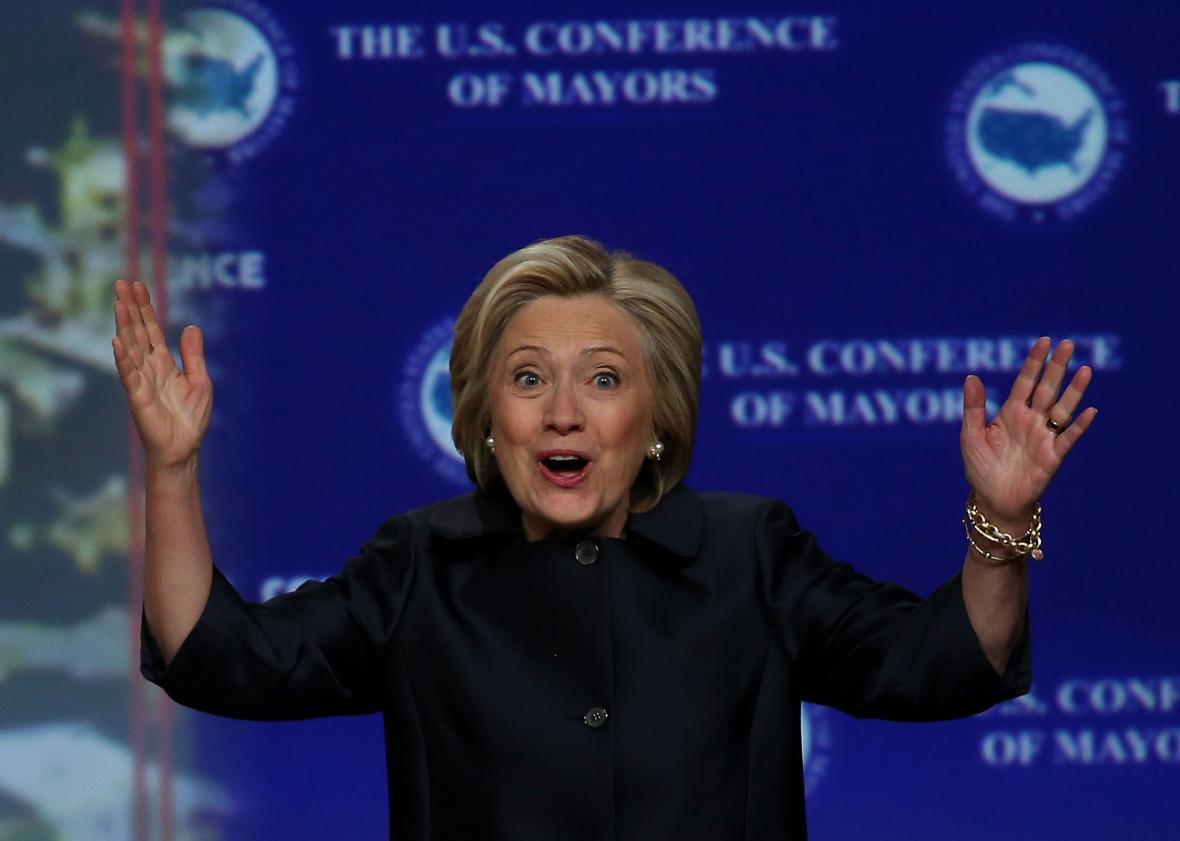The crowded field of presidential hopefuls played to type on Tuesday in reacting to the news of the historic deal between Iran and six world powers. Republicans responded by bashing President Obama’s negotiating skills, predicting the deal will launch a chaotic nuclear arms race in the Middle East, and calling on Congress to do all it can to scuttle the agreement. Hillary Clinton, meanwhile, offered a more measured response by praising the deal while still giving herself room to take a harder line toward Iran than Obama.
“This is an important step in putting a lid on Iran’s nuclear program,” the former secretary of state said in Washington following a closed-door meeting with House Democrats. Clinton, though, went on to voice “concerns” about the Islamic Republic’s “bad behavior,” such as its state sponsorship of terror groups, and stressed that the terms of the deal would have to be enforced “vigorously, relentlessly” by the United States and its allies. “As president, I would be absolutely devoted to assuring the agreement is followed,” she said.
As I noted earlier today, the responses from the presidential hopefuls aren’t just empty talking points. While the Republican-controlled Congress doesn’t appear to have the votes to overcome Obama’s promised veto of any legislation that undermines the agreement, the next president could use his or her executive authority to walk away from the deal. The Republican candidates’ reactions suggest they would do just that if given the chance. Clinton’s comments, meanwhile, suggests she’d be willing to see it through.
That was not always a given. Years before Clinton helped initiate the talks that led to Tuesday’s landmark agreement, she memorably clashed with then-Sen. Barack Obama over the issue during the 2008 primary, calling his pledge to meet personally with leaders of countries like Iran “irresponsible and frankly naïve.” Later in the campaign, Clinton then threatened to “totally obliterate” Iran if the Islamic Republic launched a nuclear strike on Israel, remarks that drew a formal U.N. complaint from Iran and that prompted Obama to compare her to President George W. Bush.
Clinton’s more hawkish views on Iran didn’t stop once she became Obama’s top diplomat, as Michael Crowley documents in Politico. While she and Obama were generally on the same page during the negotiations, Clinton was much more distrusting of Tehran than her boss and significantly more willing consider conflict.
Since leaving the administration, Clinton has made no secret of her skepticism, while at the same time touting the nuclear talks as a necessary and potentially fruitful step. “President Obama has said that the odds of getting a comprehensive agreement are 50-50. I personally am skeptical that the Iranians will follow through and deliver,” she told an American Jewish group last year. “I’ve seen many false hopes dashed over the years, but nonetheless this is a promising development and we need to test it to see what can be achieved.” She’s continued to try to strike that cautious balance on the campaign trail this year, warning voters in New Hampshire earlier this month that Iran remains an “existential threat” to Israel, and that even once a deal was hammered out, “we will still have major problems from Iran.”
Such tough talk aside, though, Clinton pretty much has to express general support of the final agreement, given the role she played in laying its groundwork. As secretary of state, she dispatched two of her top advisers to meet with their Iranian counterparts in secret at the same time the United Nations was imposing sanctions on the country. Coming out against the deal now could have damaged her diplomatic legacy, risked alienating the president and his team, and could have also provided another opening to her left for Bernie Sanders, who wasted no time trumpeting the deal as a “victory for diplomacy over saber-rattling” that “could keep us from being drawn into another never-ending war.”
